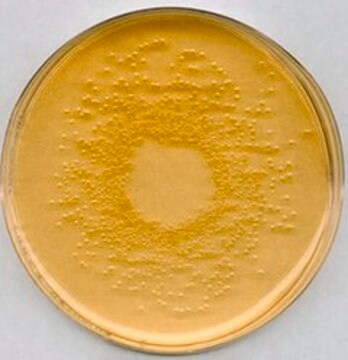1.05398
GranuCult® Malt extract agar
For the detection, isolation, and enumeration, for yeasts, for molds
About This Item
Recommended Products
Agency
EP
JP
USP
Quality Level
sterility
non-sterile
form
granular
manufacturer/tradename
GranuCult® prime
technique(s)
microbiological culture: suitable
pH
5.6 (22 °C, 48 g/L in H2O, after autoclaving)
solubility
48 g/L
bulk density
590 kg/m3
application(s)
food and beverages
microbiology
storage temp.
15-25°C
suitability
molds
yeasts
Related Categories
General description
Application
Analysis Note
Appearance (color): brown
pH-value (25 °C): 5.4 - 5.8
Growth promotion test in accordance with the current version of DIN EN ISO 11133.
Inoculum on reference medium (Candida albicans ATCC 10231 (WDCM 00054)):
Inoculum on reference medium (Saccharomyces cerevisiae ATCC 9763 (WDCM 00058)):
Inoculum on reference medium (Saccharomyces cerevisiae ATCC 9080):
Inoculum on reference medium (Rhodotorula mucilaginosa DSM 70403):
Colony count (Candida albicans ATCC 10231 (WDCM 00054)):
Colony count (Saccharomyces cerevisiae ATCC 9763 (WDCM 00058)):
Colony count (Saccharomyces cerevisiae ATCC 9080):
Colony count (Rhodotorula mucilaginosa DSM 70403):
Recovery on test medium (Candida albicans ATCC 10231 (WDCM 00054)): ≥ 70 %
Recovery on test medium (Saccharomyces cerevisiae ATCC 9763 (WDCM 00058)): ≥ 70 %
Recovery on test medium (Saccharomyces cerevisiae ATCC 9080): ≥ 70 %
Recovery on test medium (Rhodotorula mucilaginosa DSM 70403): ≥ 70 %
Growth (Geotrichum candidum DSM 1240): good to very good
Growth (Penicillium commune ATCC 10428): good to very good
Growth (Aspergillus brasiliensis (formerly A. niger) ATCC 16404 (WDCM 00053)): good to very good
Growth (Trichophyton ajelloi ATCC 28454): moderate to good
Incubation: Molds 7 days at 26 ± 2 °C, Yeasts 3 days, aerobic
A recovery rate of 70 % is equivalent to a productivity value of 0.7.
The indicated colony counts result from the sum of a triple determination.
Reference media: SABOURAUD Agar
Footnote
The designations basic, plus, or prime are added to indicate the quality control level, from basic quality control to standard QC plus to prime for full regulatory compliance.
Legal Information
Storage Class Code
11 - Combustible Solids
WGK
WGK 3
Certificates of Analysis (COA)
Search for Certificates of Analysis (COA) by entering the products Lot/Batch Number. Lot and Batch Numbers can be found on a product’s label following the words ‘Lot’ or ‘Batch’.
Already Own This Product?
Find documentation for the products that you have recently purchased in the Document Library.
Customers Also Viewed
Articles
See how two water sources compare when preparing and performance testing microbiological culture media acc. to EN ISO 11133: centrally purified water vs. water from a Milli-Q® IX system were assessed. Tests included media specific for Listeria and Salmonella pathogens.
Our team of scientists has experience in all areas of research including Life Science, Material Science, Chemical Synthesis, Chromatography, Analytical and many others.
Contact Technical Service
